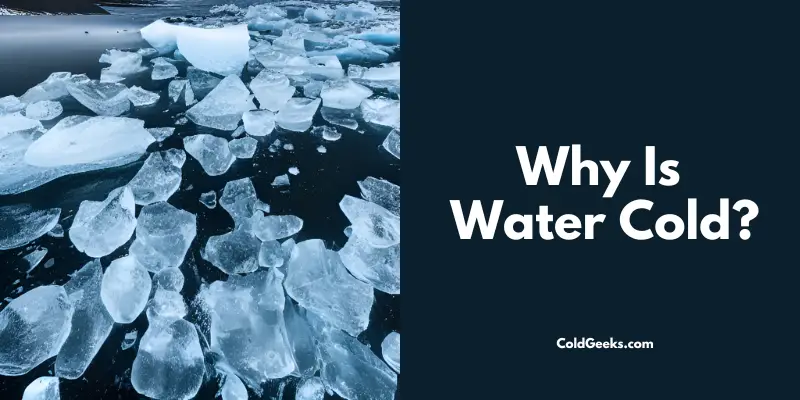Everyone knows that water is cold, but do you know why? This blog post will explore the science behind why water is cold and how it affects our bodies.
Why is water cold?
Water is cold because it is a good conductor of heat. It absorbs heat from the surrounding environment and transfers it to the body. Water is also cold because of water’s rate of evaporation, density, and latent heat of fusion. Not all water is cold.
Keep reading to find out everything you need to know about why water is cold.
10 Reasons Why Water Is Cold

There are at least 10 reasons why water is cold.
Let’s go through each one so that you know all the most important reasons.
1. Easily Transfers Heat
Water is a good conductor of heat, meaning it can quickly transfer heat from one object to another.
When water is exposed to cold temperatures, it will quickly lose heat to its surroundings, making it cold. This is why the water in colder climates is colder than water in warmer climates.
2. Heating Capacity
The amount of heat energy needed to increase the temperature of water is significant.
This implies that once the water starts to cool down, it takes a long time to warm back up. Not only is water cold but it stays cooler for long periods of time.
3. Latent Heat of Fusion
It takes a lot of heat to transform it from a liquid to a solid (or vice versa) (or vice versa). As a result, melting ice requires a lot of heat.
And once water freezes, it takes a while for it to thaw.
4. Vaporization and Condensation
Since water has a high latent heat of vaporization, turning it from a liquid to a gas requires a lot of heat (or vice versa).
Therefore, boiling water requires a lot of heat.
After the water has evaporated, it takes a while for it to condense back into a liquid.
5. Cohesive in Nature
The molecules in water are attracted to each other, meaning they stick together.
This is called cohesion.
Water has a relatively high surface tension, which makes it harder for heat to penetrate the surface and enter the water.
6. Water Molecules Are Adhesive
The molecules in water are also attracted to other substances (this is called adhesion).
Since the surface tension of water is somewhat higher, it is harder for heat to affect the water below the surface.
7. Water is Highly Dense
Water is a relatively dense substance.
It has a high mass per unit of volume. It takes a lot of energy to move water around, and thus it takes longer for water to reach equilibrium (the point at which all the molecules are the same temperature).
8. High Vapor Pressure
Why is water cold?
It turns out that the answer has to do with vapor pressure. The pressure exerted by a vapor, or gas, when it is in equilibrium with its non-vapor phases is known as vapor pressure.
In other words, it’s the pressure of the water vapor molecules in the air.
The higher the vapor pressure, the higher the temperature of the water. That’s because the molecules are moving around more and colliding more often.
When the vapor pressure is high, water molecules are moving faster and collide more often, making them colder.
9. Water is Heavier
Specific gravity is a measure of the density of a substance relative to the density of water.
Water has a very high specific gravity, which means that it is very dense. This density makes it difficult for heat to move through water, which is why it takes longer to heat up than other substances.
Additionally, this density also makes it difficult for heat to escape from water once it has been heated up.
10. Rate of Evaporation
Here is a good video about why water is cold:
Why Is Water Cold in the Shower?
Water is cold in the shower because the water pressure forces the cold water into the pipes faster than the hot water can travel.
This causes a decrease in the temperature of the water in the pipes, which is then transferred to the water in the shower. Additionally, showers typically have less insulation than other parts of the home, so they lose heat more quickly.
Finally, the air in the bathroom is often cooler than the air in other parts of the home.
Ultimately, this also contributes to the coldness of the water in the shower.
Why Is Water Cold in the Summer?
Water is cold in the summer because it is a good conductor of heat.
It transfers heat from the surrounding air to the water, which makes it cooler. When the water is cold, it can’t absorb as much heat from the sun, so it stays cooler.
In the winter, water is a good insulator and doesn’t transfer heat as well, so it stays warmer.
Water is also cold in the summer because of evaporation.
When water evaporates, it takes heat with it, which cools the water that’s left behind. This is why you feel cooler when you’re sweating or when you’re near a waterfall – the evaporation is cooling you off.
Why Is Tap Water Cold?
Some people believe that tap water is cold because the pipes that deliver it are cold.
However, this is not usually the case. The water in the pipes is actually the same temperature as the surrounding air. So, if it’s cold outside, the water in the pipes will be cold, too.
The only reason why tap water might feel colder than the air is that it’s coming out of a faucet and thus has a higher velocity.
But once it’s in your glass, it will quickly reach the same temperature as the surrounding air.
Why Is Water Cold in an Earthen Pot?
Water is cold in an earthen pot because earthen pots are made of clay, which is a poor conductor of heat.
This means that the water in the pot will not absorb much heat from the surrounding air and will therefore remain cold.
Clay is also a very porous material, which means that it will absorb water from the surrounding air.
Absorbing this extra moisture helps to keep the water in the pot cold.
Why Is Deeper Water Colder?
Deeper water is colder than shallower water for a number of reasons.
One explanation has to do with how much sunshine reaches the water. The deeper you go, the less sunlight there is since the sun’s rays can only go so far into the sea.
This indicates that the ocean’s bottom water is significantly colder than its surface water.
The way water circulates is a further explanation. Cold water sinks to the bottom while warm water rises to the surface.
As a result of the ongoing replenishment of cold water from below, the water becomes colder the deeper you go.
Finally, deep water is colder because it is under more pressure than shallow water.
The deeper you go, the more pressure there is on the water. This pressure makes it harder for the water to heat up, so it remains colder.
Are All Oceans Cold?
Oceans are a very important part of Earth’s climate system.
They store a lot of heat and help to regulate the global climate. However, not all oceans are cold. In fact, some parts of the ocean can be quite warm.
The water near the equator is usually warmer than the water at the poles.
This is because the sun’s rays hit the equator more directly than they hit the poles. The water near the surface of the ocean can also be quite warm in some places.
This is because the sun heats up the ocean’s surface more than the deeper layers of water.
However, there are still cold deep waters even in these warm parts of the ocean. These deep, cold waters are a very important part of the ocean’s climate system.
They help to regulate the Earth’s temperature and keep the planet from getting too hot or too cold.
Final Thoughts: Why Is Water Cold?
Although scientists still debate the answer to this question, we better understand why water is cold than ever before. And now that you know the science behind it.
We have a lot of other articles on this site about the cold.
Check out a few of these hand-selected articles before you go:
- Does Leg Hair Grow Faster When Cold? (Solved & Explained)
- Is Exercising in Cold Weather Good for You? (Solved)
- Is Tesla Good for Cold Weather? (Tested & Explained)
- Is Bass Fishing Good in Cold Weather? (17 Must-Know Facts)

